
Are You a "Real" Dietitian?
As a Registered Dietitian myself, I've spent over two decades in the field, and I can tell you that even with all that experience, the question "Am I a real dietitian?" has whispered in my ear. You might have felt it too. It's a pervasive feeling, especially common among high-achieving individuals like many nutrition professionals, and it has a name: Impostor Phenomenon (Clance & Imes, 1978; J. L. Hernandez, 2023; J. Hernandez & Lopez, 2022; Landry et al., 2022).
It's the gnawing sense that you're a fake, a fraud, that you don't truly deserve the successes or achievements you've earned. Perhaps you attribute your accomplishments to luck, chance, or "who you knew" rather than "what you knew". But here's the crucial truth: you are not alone, and it's a big lie. You are good enough, and you deserve to be exactly where you are.
Where Do These Feelings Come From?
Initially identified in high-achieving women (Clance & Imes, 1978), particularly those in higher education and PhD students (like I was when I made the video a year and a half before finishing my PhD), researchers found common threads in childhood experiences:
1. The "Always Did Well" Student: This person excelled in school, earning good grades, and that expectation for continued high achievement followed them. For many dietitians, this might resonate deeply – a drive for perfection that became an internal pressure, even if external expectations weren't always overt. My own experience was certainly rooted in this internal expectation of perfection.
2. The "Not as Good as a Sibling" Individual: This involved growing up feeling overshadowed by a sibling who was perceived as smarter, more athletic, or could "never do wrong". While this wasn't my personal story, it's another common root for impostor feelings.
The Hidden Costs of Impostor Phenomenon
This constant internal pressure and fear of being "found out" can have significant adverse effects:
• Perfectionism and Overwork: My perfectionism drove me to take an extra class during my PhD program, obsessively retaking quizzes to maintain a perfect GPA, even when it caused immense stress. This relentless pursuit of perfection, while sometimes beneficial, can become obsessive and detrimental, leading to excessive, often unnecessary, hard work. How often do we, as RDNs, pour endless hours into a perfect presentation or meticulously scrutinize every detail, fearing anything less than flawless?
• Anxiety and Depression: The constant worry about being perfect, about people discovering you're a fraud, often leads to heightened anxiety and can contribute to depression.
• Dangerous Comparisons: In our interconnected world, this is especially perilous. We tend to compare our full, messy reality to the curated highlight reels of others (Gardner et al., 2019; Landry et al., 2022). I once compared myself to a colleague, the same age as me, who had achieved full professor status and tenure years before I even finished my PhD. It felt like she had "accomplished more." However, my unique path and experiences enriched my teaching and professional life in ways hers could not. Social media often exacerbates this, showing only the "perfect" picture people want to portray, making comparisons incredibly misleading.
Taking Back Your Confidence
If these feelings resonate with you, please know that you are not alone. There's a name for what you're experiencing, and there are ways to address it. Tools like the Clance Impostor Phenomenon Scale (Clance, n.d.), developed by early researchers in this area, can help you understand your level of these feelings.
While severe cases may benefit from psychotherapy, a broad population with lower levels of impostor phenomenon can take actionable steps to decrease these feelings. The journey involves increasing self-confidence and actively working to diminish the grasp of impostor phenomenon.
Remember, your unique experiences, your journey, and your dedication make you the valuable nutrition professional you are today. Don't let the "big lie" of impostor phenomenon dim your light or diminish your satisfaction in a profession where you truly belong.
Works Cited
Clance, P. R. (n.d.). Impostor phenomenon. Pauline Rose Clance, PhD, ABPP. Retrieved February 13, 2023, from http://paulineroseclance.com/impostor_phenomenon.html
Clance, P. R., & Imes, S. A. (1978). The imposter phenomenon in high achieving women: Dynamics and therapeutic intervention. Psychotherapy: Theory, Research & Practice, 15(3), 241–247. https://doi.org/10.1037/h0086006
Gardner, R. G., Bednar, J. S., Stewart, B. W., Oldroyd, J. B., & Moore, J. (2019). “I must have slipped through the cracks somehow”: An examination of coping with perceived impostorism and the role of social support. Journal of Vocational Behavior, 115. https://doi.org/10.1016/j.jvb.2019.103337
Hernandez, J. L. (2023). Prevalence of Impostor Phenomenon by Practice Area in Registered Dietitian Nutritionists. Future Dimensions in Clinical Nutrition Practice, 11–15.
Hernandez, J., & Lopez, N. (2022). Prevalence of impostor phenomenon in Registered Dietitians. Journal of the Academy of Nutrition and Dietetics, 122(9), A24. https://doi.org/10.1016/j.jand.2022.06.090
Landry, M. J., Bailey, D. A., Lee, M., Van Gundy, S., & Ervin, A. (2022). The impostor phenomenon in the nutrition and dietetics profession: An online cross-sectional survey. International Journal of Environmental Research and Public Health, 19(9), Article 9. https://doi.org/10.3390/ijerph19095558
